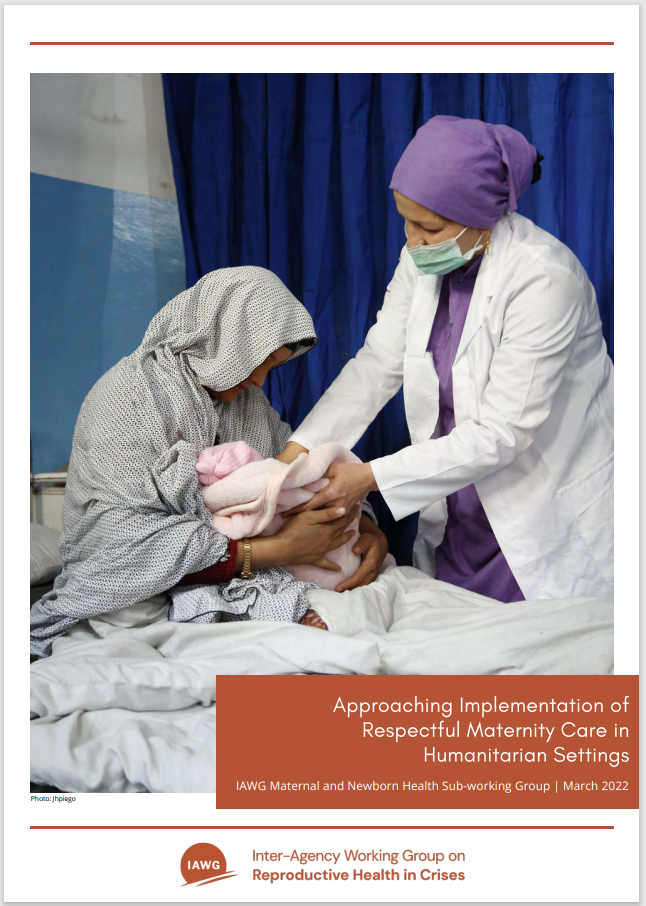Respectful Care
Implementation resources and tools
This page suggests select tools, resources, and packages to support country implementation of key quality of care approaches.
Materials to support implementation of promising approaches to strengthen respectful care at the country level include the following. Some of these select tools are related to implementation research for respectful care, and some support programming that includes a focus on respectful care:

- The RMC Operational Guidance guides program managers and local stakeholder counterparts through a flexible process of designing, implementing, and monitoring respectful care efforts based on a deep understanding of the local context. It is available in English, French, and Spanish. Briefs for the operational guidance are also available in English, French, and Spanish.

- The WHO QoC Network has developed a monitoring framework (and country implementation guidance) which builds on the WHO maternal and newborn quality standards and measures, and includes illustrative indicators for each WHO quality statement. The QoC Monitoring Framework includes ‘common measures’ and a flexible catalogue of QI measures that encompass quality statements under experience of care standards four, five, and six. The monitoring framework is a useful resource for MNH policy-makers and program implementers.)

- Approaching Implementation of Respectful Maternity Care in Humanitarian Settings, written by the IAWG Maternal and Newborn Health sub working group outlines interventions implemented in stable settings that maternal and newborn health (MNH) providers and program managers in crisis-affected settings have identified as promising strategies for humanitarian settings. While RMC is being incorporated in some humanitarian and fragile settings, more evidence around the implementation and effectiveness of these interventions for diverse populations including host communities, refugees, internally displaced persons, young mothers, and other vulnerable groups is needed. This brief can be used as a tool to improve and promote RMC in fragile and conflict-affected settings.
Additional tools developed within projects focused on respectful care that support the design and implementation of interventions to promote respectful care for women and newborns and reduce mistreatment include:
- AMDD’s Staha project systematically studies the types, prevalence, and root causes of disrespectful and abusive maternity care experiences and interventions to reduce D&A practices. Their website includes links to tools used in AMDD’s first study of disrespect and abuse (D&A) of women during facility birth. The tools have since been applied to research into the prevalence of D&A in other contexts.
- The Population Council (through the USAID-supported Translating Research into Action Project) and the Ministry of Health in Kenya collaborated with the Federation of Women Lawyers (FIDAKenya) and the National Nurses Association of Kenya-Midwives’ Chapter (NNAK-MC) to examine the extent and causes of mistreatment in Kenya and to design and implement interventions to reduce mistreatment. The Heshima project developed study instruments here to measure mistreatment throughout the study’s formative, baseline, and endline stages. The subsequent Respectful Maternity Care Resource Package is a set of manuals, tools, and resources to ensure high-quality, respectful maternal and newborn health services and help program managers, health workers, and technical advisors train facility-based providers and community health workers.
Measuring respectful care
Note that there is no single measure that can capture “person-centered care” in its entirety. Rather, person-centered care encompasses many elements. People’s experience of care is at the heart of measuring person-centered care (e.g. did a person feel respected during her antenatal care visit?) There are also important normative standards of person-centered care (e.g. was a woman offered the option to have a labor and birth companion of her choice?).
The WHO vision and framework for quality of MNCH care includes eight aspirational standards (domains of quality care) of which three are categorized as ‘experience of care’ standards:
- Effective communication
- Respect and dignity
- Emotional support
People’s experience of care spans a continuum that includes outright mistreatment on one end and highly person-centered care on the other end. It is important that measures are able to capture this continuum and to capture both positive and negative care. The absence of mistreatment does not equate with person-centered care.
- Validated tools to measure person-centered care in developing settings – a full (30 question) person-centered maternity scale
*refer to Table 5 for items from the 30- item person centered maternity care (PCMC) scale and you may download a shorter (13 question) person-centered scale directly from the website
- The Birth Place Lab team developed and validated additional quality measures: the Mistreatment in Childbirth (MIST) index, Mother’s Autonomy in Decision Making (MADM) scale, the Mothers on Respect (MOR) index that are being applied across 23 countries to evaluate quality of maternity care at the institutional, system, and country levels.
- The RMC Operational Guidance above includes a section (pages 3-7) on understanding and measuring respectful maternity care and disrespect and abuse in childbirth and includes three appendices (5,6,7) that summarize qualitative and quantiative data collection methods for measuring RMC and mistreatment, including references to many tools in the published literature.
- STAY TUNED! A forthcoming guide is being developed by WHO and the MOMENTUM Country and Global Leadership Program titled Measuring and Monitoring Quality of Health Care Services to Improve Care for Women, Newborns and Children: A practical Guide for Program Managers’ It reviews common approaches and practical considerations for measuring and monitoring person-centered care. A link will be added when this resource is published.

